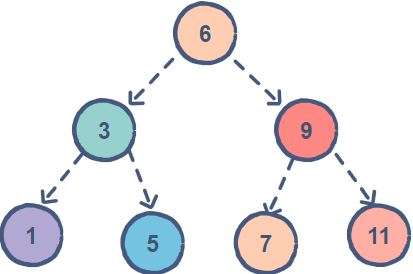How to check if a binary tree is a binary search tree
A Binary Search Tree (BST) is a binary tree with the following properties:
-
The left subtree of a particular node will always contain nodes whose keys are less than that node’s key.
-
The right subtree of a particular node will always contain nodes with keys greater than that node’s key.
-
The left and right subtree of a particular node will also, in turn, be binary search trees.
The tree on the right is a BST.
Algorithm
To see if a binary tree is a binary search tree, check:
-
If a node is a left child, then its key and the keys of the nodes in its right subtree are less than its parent’s key.
-
If a node is a right child, then its key and the keys of the nodes in its left subtree are greater than its parent’s key.
Code
// Including dependancies.#include <iostream>#include <limits>using namespace std;// A node of a tree.struct Tree{int data;Tree *left;Tree *right;Tree(int data){this -> data = data;left = NULL;right = NULL;}};// Function to check if a binary tree is a BST. Note that this// code allows for duplicate keys.bool isBST(Tree* node, int min, int max) {// Base case. An empty tree is a BST.if (node == NULL)return true;// Checking if a key is outside the permitted range.if (node -> data <= min)return false;if (node -> data >= max)return false;// Sending in updates ranges to the right and left subtreereturn isBST(node -> right, node -> data, max) &&isBST(node -> left, min, node -> data);}int main() {// Creating a BSTTree *root = new Tree(6);root -> left = new Tree(3);root -> right = new Tree(9);root -> left -> left = new Tree(1);root -> left -> right = new Tree(5);root -> right -> left = new Tree(7);root -> right -> right = new Tree(11);// Passing in the min and the max value that can be// represented inside an integer.int min = std::numeric_limits<int>::min();int max = std::numeric_limits<int>::max();if(isBST(root, min, max)){cout<<"This binary tree is a BST."<<endl;}else{cout<<"This binary tree is not a BST."<<endl;}return 0;}
Free Resources
Copyright ©2025 Educative, Inc. All rights reserved
